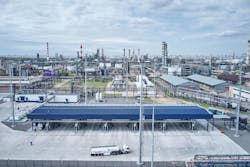Gazprom Neft to add new hydrocracker at Moscow refinery
PJSC Gazprom Neft subsidiary JSC Gazpromneft-MNPZ has let a preliminary contract to DL E&C Co. Ltd. of South Korea and its subsidiary Daelim RUS LLC to deliver a suite of services on construction of a new hydrocracking plant to be built as part of the operator’s ongoing modernization and upgrade of its 12-million tonne/year Moscow refinery (OGJ Online, May 5, 2017; June 2, 2016).
As part of the agreement, DL E&C will provide engineering design and procurement services, while Daelim RUS will supervise procurement and construction activities for the new unit, DL E&C said in a Mar. 12 filing to the Korea Exchange.
The Mar. 11 preliminary agreement, which will convert into a formal contract within 90 days, is valued at 327.1-billion won and will run for 42 months from the date of commencing work on the project, according to the service provider.
DL E&C—which parent company Daelim Industrial Co. Ltd. spun off Jan. 4, 2021 by dividing out its construction business—disclosed no additional details regarding the proposed hydrocracking plant.
Moscow refinery modernization
The new hydrocracking unit planned for the Moscow refinery follows Gazpromneft-MNPZ’s July 2020 commissioning of its 98-billion rubles Euro+ combined oil refining unit (CORU), an integral element of the manufacturing site’s second-phase modernization designed to improve the manufacturing site’s overall environmental performance as well as its yield of light-end, Euro 5-quality petroleum products, including gasoline, diesel, and aviation kerosine (OGJ Online, July 24, 2020; June 18, 2018; July 23, 2015).
In its fourth-quarter 2020 and preliminary yearend 2020 earnings report released in February 2021, Gazprom Neft said overall modernization works at the Moscow refinery had reached 80%, with full ramp-up of the Euro+ CORU in third-quarter 2020 increasing refining depth at the site to 85%.
The Euro+ CORU—which consists of a 6-million tpy primary atmospheric-vacuum distillation unit; a 1-million tpy gasoline reforming unit; a 2-million tpy diesel (distillate) hydrotreating unit that includes an iso-dewaxing unit; a gas fractionation unit; and an amine regeneration unit also has enabled increased production of Euro 5-quality gasoline and diesel fuels, as well as helped further reduce the refinery’s operational impact on the environment, including a 7% slash in its energy consumption, according to a series of 2020-21 releases from Gazpromneft-MNPZ.
While neither Gazprom Neft nor Gazpromneft-MNPZ have revealed specific information regarding the planned grassroots hydrocracking plant, the project presumably comes as part of a third phase of the refinery’s modernization program that will focus on further improving environmental performance and deepening refining capabilities at the site, and on which Alexander Dyukov—Gazprom Neft's chief executive officer and chairman of its management board—said in 2020 would require an investment of about 160 billion rubles.
Initiated in 2011 and scheduled for completion in 2025 at a final estimated cost of 350 billion rubles, the Moscow refinery’s modernization program has included various initiatives allowing the refinery to reduce its premodernization environmental impacts by 50%, with anticipation of another 50% reduction in impacts to occur once all Phase 2 works are completed in 2021 (OGJ Online, Mar. 27, 2020).
About the Author
Robert Brelsford
Downstream Editor
Robert Brelsford joined Oil & Gas Journal in October 2013 as downstream technology editor after 8 years as a crude oil price and news reporter on spot crude transactions at the US Gulf Coast, West Coast, Canadian, and Latin American markets. He holds a BA (2000) in English from Rice University and an MS (2003) in education and social policy from Northwestern University.

